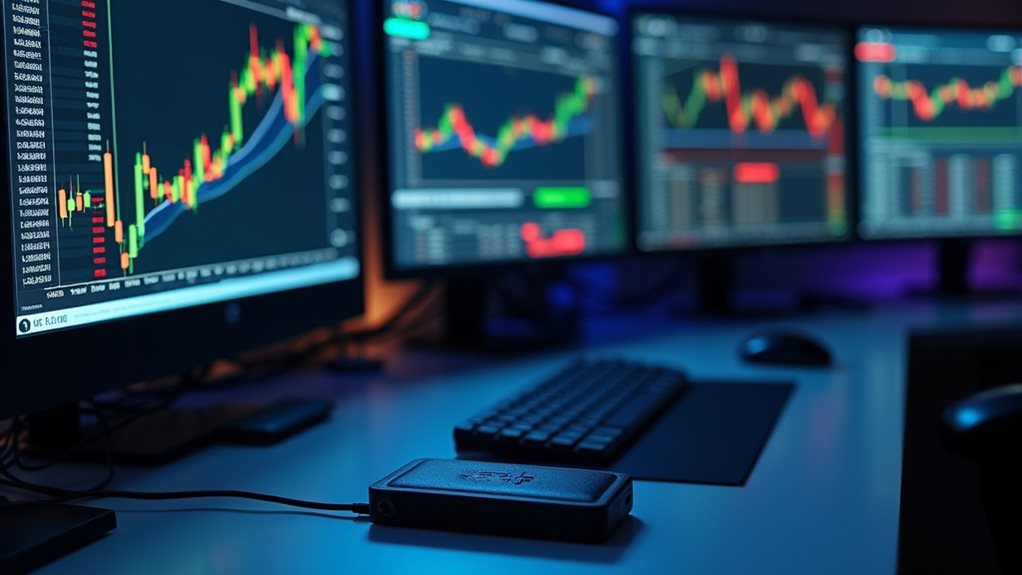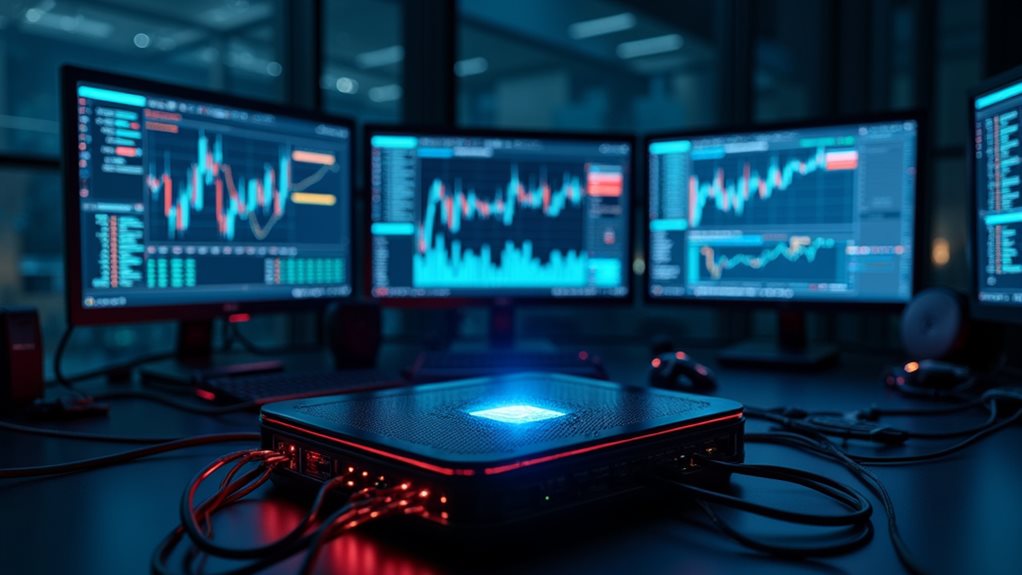Trading altcoins requires careful navigation through volatile cryptocurrency markets. Successful traders focus on selecting secure exchanges, understanding trading pairs, and implementing risk management strategies. Technical analysis and market sentiment drive price movements, while proper account verification through KYC is mandatory before trading. Hardware wallets protect assets, and diversification helps minimize exposure. Regulated platforms like Binance and Coinbase offer educational resources for traders. The complete guide reveals the intricate details of mastering altcoin trading.

Trading altcoins isn't for the faint of heart. The cryptocurrency market's infamous volatility can turn a trader's portfolio into a rollercoaster of emotions – one day you're up, the next you're questioning your life choices. Unlike traditional markets that give traders a break, crypto exchanges run 24/7, creating an environment where anything can happen while you sleep. Traders can access over 5,000 CFDs for diverse investment opportunities.
Getting started requires choosing the right exchange, and boy, there are plenty to pick from. Smart traders prioritize exchanges with robust security measures and high trading volumes. After all, nobody wants their digital assets vanishing into the cyber abyss. Each platform comes with its own fee structure, and those fees can eat into profits faster than a hungry teenager raids a fridge. Many traders opt for platforms like Binance and Coinbase that offer extensive educational resources and customer support. Privacy coins provide enhanced anonymity features for traders seeking confidential transactions.
Choose your crypto exchange wisely – security and volume matter more than flashy features or marketing promises.
The actual trading process starts with the mundane task of creating an account. Exchanges demand personal information through Know Your Customer (KYC) procedures – yes, they want to know who's behind those trades. Once verified, traders can deposit funds and plunge into the sea of trading pairs. Market orders offer instant gratification, while limit orders let traders set specific prices. Patience is a virtue, except when it isn't.
Understanding price movements in the altcoin market requires a combination of skills and tools. Technical analysis charts look like abstract art to newcomers, but they're essential for predicting where prices might head next. Market sentiment plays a huge role too – sometimes all it takes is one viral tweet to send prices soaring or crashing. Some traders leverage portfolio diversification to minimize risk exposure in the volatile crypto market.
Fundamental analysis matters, though it's often overlooked by traders chasing quick gains. Security can't be an afterthought in this wild west of finance. Hardware wallets are like digital fortresses for storing altcoins, and they're worth every penny. Trading on regulated exchanges might feel restrictive, but it beats losing everything to a sketchy platform that disappears overnight.
Smart traders never leave large amounts of crypto on exchanges – that's just asking for trouble. Success in altcoin trading often comes down to spotting momentum before everyone else does. It's a delicate dance of risk management, market analysis, and sometimes pure luck.
The market doesn't care about feelings or fair play – it just does what it does. Some traders make fortunes, others lose their shirts. That's just how it goes in the world of altcoin trading, where fortunes can change faster than anyone can say "to the moon."
Frequently Asked Questions
What Happens if an Exchange Gets Hacked While My Altcoins Are There?
Exchange hacks can be devastating. Users might lose access to their altcoins – sometimes permanently.
The exchange typically freezes all accounts while investigating the breach. Best case? The exchange has insurance or enough funds to compensate users. Worst case? Assets gone forever.
Most major hacks trigger market panic, regulatory crackdowns, and a whole lot of finger-pointing. And yes, it happens more often than anyone would like to admit.
Can I Trade Altcoins Without Verifying My Identity on Exchanges?
Yes, several exchanges allow altcoin trading without identity verification.
KuCoin, MEXC, and CoinEx offer no-KYC trading options – but there's a catch. Withdrawal limits are considerably lower for unverified accounts. KuCoin caps it at 1 BTC daily, while MEXC allows up to 20 BTC.
Decentralized exchanges like Uniswap skip the whole identity thing entirely.
Just remember: no-KYC trading usually means saying goodbye to fiat deposits and withdrawals.
How Do I Report Cryptocurrency Trading Gains and Losses for Taxes?
Crypto traders need to report all gains and losses to the IRS. No exceptions.
They use Form 8949 and Schedule D to document every trade – yeah, even those tiny altcoin flips.
Long-term holds (over a year) get better tax rates than short-term trades.
Losses? They can offset gains or deduct up to $3,000 from regular income.
Smart traders use crypto tax software to track everything.
The IRS isn't messing around with crypto anymore.
Which Hardware Wallet Is Best for Storing Multiple Altcoins?
For storing multiple altcoins, the SafePal S1 takes the crown. Period.
It supports a massive 30,000+ cryptocurrencies – way more than competitors.
Sure, it lacks Bluetooth, but that's actually good for security. The air-gapped design means hackers can't touch it.
Plus, it's cheaper than the Ledger and Trezor options. That self-destruct feature? Pretty hardcore.
The EAL 5+ secure chip seals the deal for serious altcoin collectors.
When Is the Best Time of Day to Trade Altcoins?
Peak trading typically hits between 2:30 PM and 4:30 PM UTC.
That's when liquidity is highest and markets are most active.
Weekdays rule – especially Tuesday through Thursday.
Why? More traders, more action, more drama.
The overlap between New York and European sessions creates a sweet spot of volatility.
Weekends? Different story.
Trading volumes drop like a rock, though some brave souls find opportunities in the chaos.
Late afternoon UTC is where the real party happens.









